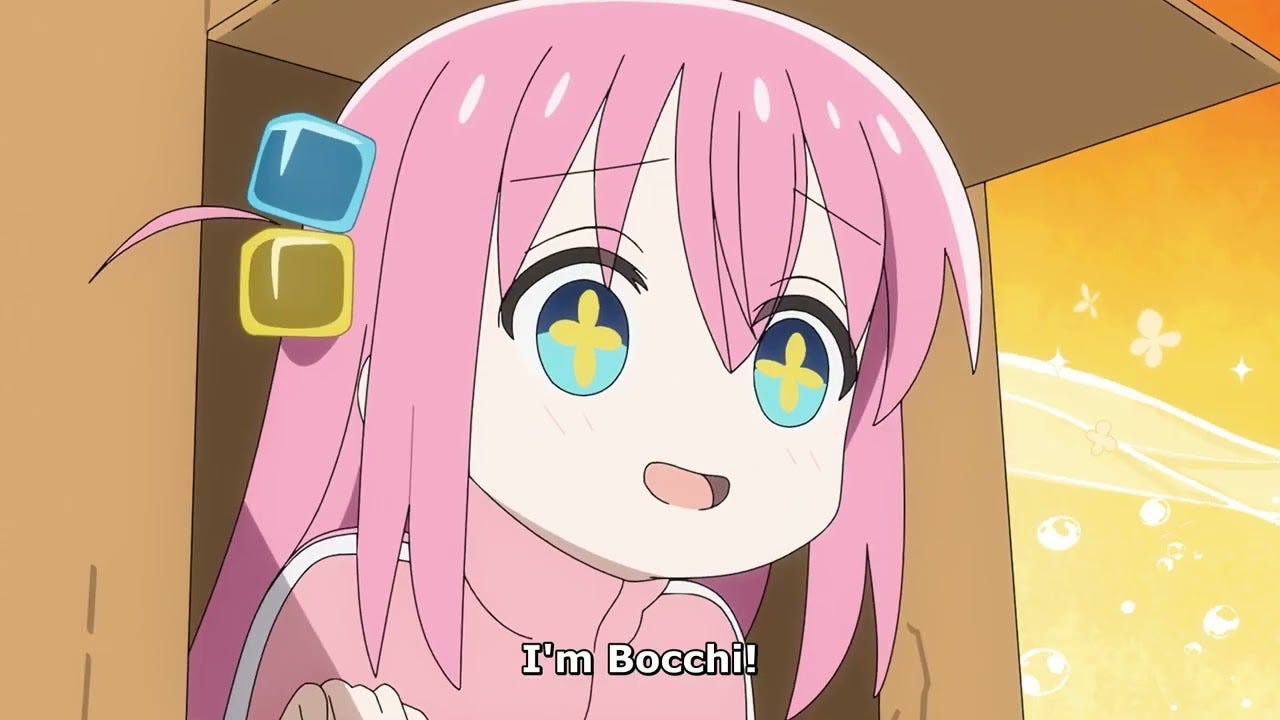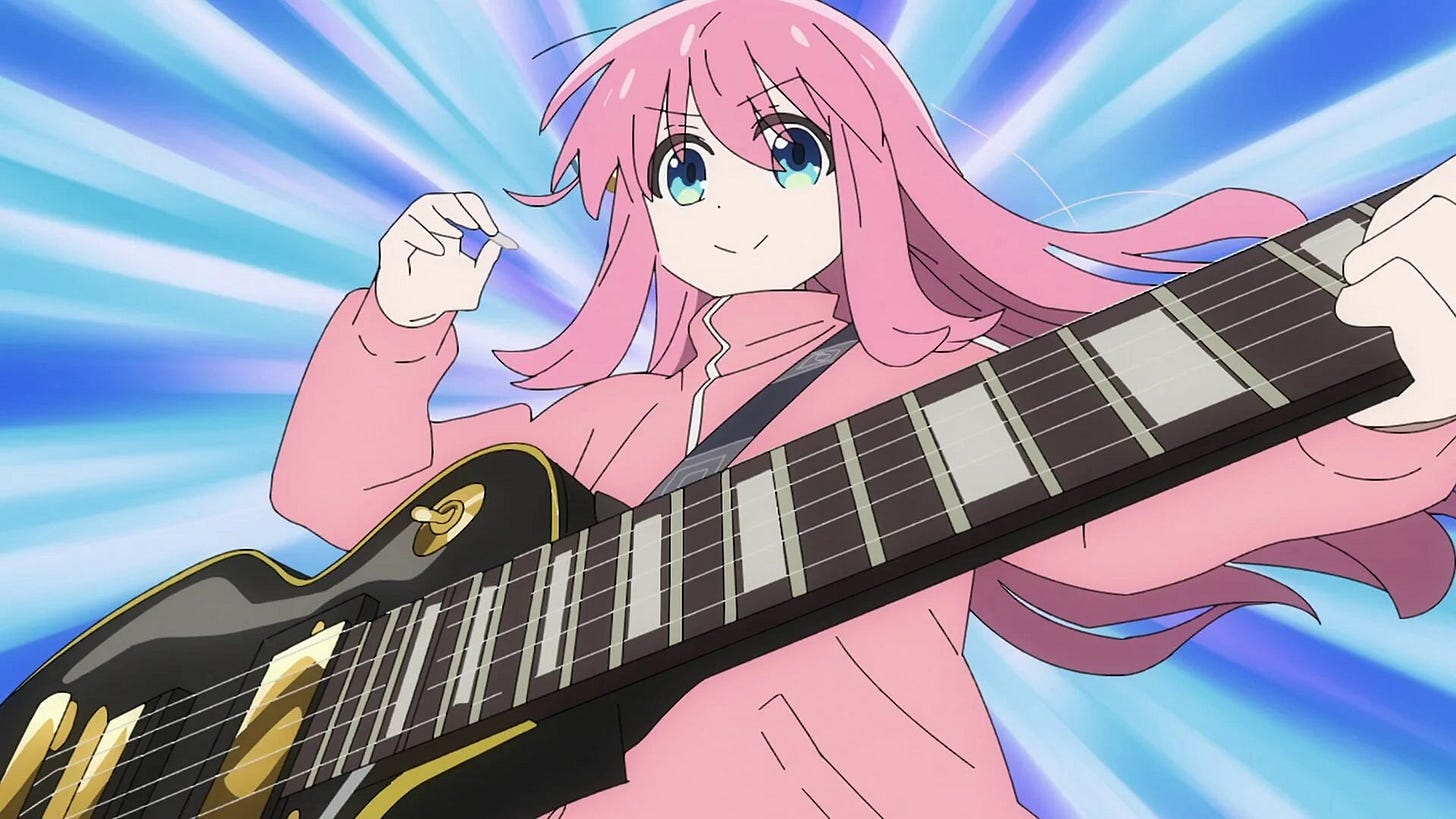
If I could hold a tune and could memorize more than 5 bars in a score, I probably would have pursued something in the musical arts. Unfortunately, I’m not as talented as those Broadway Messiahs so I pledged myself to the liberal arts.
A far more stable, financially responsible decision in this economy.
Bocchi The Rock reminded me why I love animation so much.
A good friend of mine once told me they didn’t like anime because it was just a lot of talking heads and pretty girls.
We’re no longer friends.
Just kidding.
Or am I?
But her sentiment came from a deep well of love for animation and the annoyance that as popular as anime was becoming, it did the bare minimum in regards to motion and movement.
There are a thousand and one animes to disprove that now, but when you’re not one of the Big-4-shonen-anime-powerhouses, assets have to be conserved and the animation might look, for lack of a better word, basic.
Bocchi takes that and we see the shot-reverse-shot, CU on a face with only the mouth moving banality.
Just what you’d expect from a slice-of-life comedy.
But we also get discombobulated abstract animation, strange claymations worshipping on a sundial, the Japanese Henohenomoheji face bastardization sprinkled like an afterthought (on the protagonist no less).
We see an anime fully utilizing its medium to tell a compelling story of Bocchi, an awkward, introverted kid who dreams of becoming a famous guitarist but cannot, on possibility of perception, perform in front of others.
Animation Medium
I’m a sucker for slice-of-life animes and RomComs are my all-time guilty pleasure. The thing about these very genre specific tropes is that if you’ve seen one, you’ve seen them all. They riff off of each other and have this intertextuality that is only rivaled by the MCU. The tropes are what makes the genre, and after enough time guzzling oxygen on this earth, you learn to recognize and possibly even enjoy said tropes for the familiar entertainment they provide.
We’re not going to talk about my silly obsession with sports anime or my candid obsession with animation in general [though if you want to, we can. Drop me a comment, a link, or even just a smiley face if you agree: animation is pretty great!]
and instead we’re gonna talk about Bocchi.
The namesake of this current newsletter. Most times when I meet a character like Bocchi, introverted, painfully insecure, scared to face the world in any capacity, I get annoyed pretty easily.
Yeah sure her starting at Rock Bottom immediately echoes the Hero’s Journey and we know she can only get better from here. It’s not going to be easy or linear, heck she is most likely going to regress and meet her dark-night-of-the-soul multiple times before we reach any sort of reasonable character development forward.
That’s just how the narrative goes.
And honestly? I did get annoyed. Because every step forward Bocchi took to make friends or go outside to get sunlight was immediately met with two steps backwards into Cthullu’s slimy tentacles. As funny as it is, as silly as the concept is, and as tropey as everything becomes, Bocchi really treads water in the character development department.
[Which I would argue is better as the season’s climax than even the final episode.]
Despite Bocchi being one of my least favorite character tropes bundled into one person, everything is absolutely forgivable because of the animation style.

Every emotional or mental spiral Bocchi experiences sends her into a fantasy of her own imagination, where she’s cool and suave and oh so extroverted. These scenes often show the protagonist in a heroic pose and with a personality so far into left field that I get goosebumps because I am cringing so hard.
Not only that, the animation warps so subtly, you never notice. It takes the animation medium and it uses it to tell Bocchi’s mental state so fricken well. It is a mix of 3D, claymation, and stop motion that just bends our perception of the show’s reality in subtle and unique ways.
It is also extremely hilarious to see Bocchi’s inner monologue— and done in such a way to explain her constant anxiety and angst— that her whining and bemoaning her sad life doesn’t feel, well, pathetic.
Granted, this is a pretty accurate representation of awkward tweens growing up. The self-deprecation. The fear of fitting in, of standing out, of being yourself. Bocchi’s timid demeanor is undercut by how devastated and violently emotional her inner monologue is and that is hilarious to watch unfold onscreen.
You watch this show, and you want Bocchi to succeed. You want her to make friends and develop those relationships. You want her to be confident and hold her head high because she deserves it, not because she’s a guitar prodigy and she’s our protagonist and she has pink hair— but because every child deserves to feel welcomed and loved.
You desperately root for her, but she is so self-sabotaging that it sometimes hurts to watch and the only reason I managed to finish this from beginning to end was because CloverWorks did such a bang-up job of animating this inner turmoil where it felt fresh and relatable and oh so unserious.




